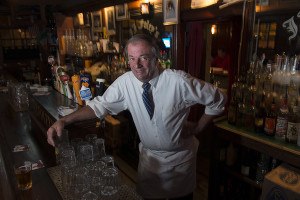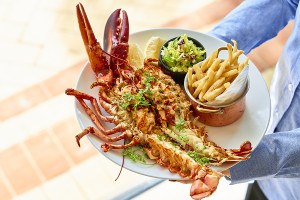Gail Simmons on Boston Chefs, Waking Up With Purpose, and Letting Loose at Hojoko

Gail Simmons photo provided
More than 11 years into her role as a judge on the Emmy award-winning Bravo TV show Top Chef, Gail Simmons has found a good rhythm. Her heart no longer pounds quite as hard as it once did when she has to tell a chef their dish didn’t cut it. And she’s travelled the world—including frequent visits to Boston. But the former culinary school student isn’t just a reality TV regular: Simmons is a special projects director at Food & Wine, an entrepreneurial educator, a mother, and, along with L.A.-based Samantha Hanks, co-founder of Bumble Pie Productions, which produced the new Food Network show Star Plates in 2016.
The New York resident was recently in town as a guest speaker for Combined Jewish Philanthropies Chai in the Hub. Boston caught up with Simmons to discuss being a role model for women in the food industry, her favorite local chefs, and what it’s really like watching chefs fail spectacularly from the comfort of the Top Chef Judges’ Table.
This interview has been edited for length and clarity.
What does a regular week in your life look like?
I definitely have routine in my year, but every week changes. Every June, I’m in Aspen for the Food & Wine Classic. And every spring, I’m shooting Top Chef. One of my favorite dimensions of my job is that I teach at Babson College in Wellesley. My husband’s family has a house in Gloucester, Massachusetts, so every summer, we spend at least 10 days there, and because it’s just 45 minutes outside Boston, I always pop in as well.
Can you tell me more about your role at Babson?
I don’t teach a traditional class. Andrew Zimmern is a good friend and an extraordinary mentor, and the two of us lead an entrepreneur-in-residence program through the Lewis Institute at Babson. Because Babson is an entrepreneurial school, every single student needs to start a socially conscious business, and these days, many of those businesses are rooted in the food world. We counsel and advise the students on how they can grow their businesses and make the biggest impact. I go into classes and do workshops, I do office hours, and I’m also co-entrepreneur-in-residence for [the Center for] Women’s Entrepreneurial Leadership, so I speak with an MBA class of women entrepreneurs [about] the specific challenges women face, like I have faced. We also lead International Food Day there. It’s a really fulfilling and multifaceted role.
The private sector stepping up to solve real-world problems, giving women the skills and confidence to do that—can you speak to those goals now, considering what’s going on in our country?
Over the last two decades or so, the industry has grown and developed such that there are so many more outlets for women, other than just being in traditional restaurants that sometimes make it hard for women to be a high-powered, executive chef. If women want to have a family, it’s very hard to work evenings and holidays. It’s very hard to do the manual labor that’s involved when you’re carrying a child. Samantha [Hanks] and I felt like there are way more women than ever in food media, but there needs to be more, and we need to be louder.
I think we all are feeling like we need to wake up with a little more purpose these days. That goes for my work at Babson, that goes for my production company, that goes for me as a mother, and it also goes to how I’m giving back to organizations, whether it’s a food bank, or Planned Parenthood, or Jewish organizations, like this event I’m coming to Boston for. I am making sure I can have my voice heard and inspire people to do the same.
Nice. Switching gears, because I do want to talk about Top Chef. Ten years and 14 seasons in, does the fervor for it surprise you at all, or did you know it was a great show from Day 1?
Oh no. Day 1, in October of 2005, we did not know it was a great show. I have this very visceral memory of sitting beside [head judge, chef, and restaurateur] Tom [Colicchio], the very first time we ever sat at the Judges’ Table, and I was so nervous I was shaking. What if we are the laughingstock of our peers? I’m OK to fail, but to fail at something we believed in, in front of the restaurant industry, chefs, and journalists. Reality [TV] was in its infancy, and were going into uncharted territory. Even until really the end of our second season, I was very nervous. But we realized our producers had the same M.O. we did: They wanted to tell a great story about the real lives of chefs and their dedication and artistry. It was about us having a real conversation about food trends and the world of food today, and they let us run with it. Obviously, the audience was really receptive.
These days, we’re 150 people in our crew. We’ve gone around the world and back. The number of restaurants that have been born of our contestants is staggering. Of any reality show ever, regardless of the genre, I don’t think it’s possible to actually quantify the success like you can with Top Chef.
Speaking of, let’s come back to Boston. We have a lot of Top Chef alumni here. Where do you like to go when you’re here?
When we shot in Boston, it was a challenging season for us, but very rewarding. In general, wherever we go the chef community is so gracious and welcoming to us, but Boston, really, was tenfold. My daughter was 5 months old, and I traveled with her and was living in a hotel. Everyone from Michael Scelfo to Michael Schlow to Ken Oringer were setting up playdates for me and making sure that I had enough food in my hotel room and that I was getting enough sleep [laughter]. Barbara Lynch, also, and Kristen Kish, obviously an alumnus we’re really proud of, both took incredible care of us. I had my birthday when we were there, and we all went to Barbara Lynch’s house, and Tiffani [Faison] brought about 100 pounds of amazing barbecue from Sweet Cheeks and we all sat around until 3 in the morning together. They’re just amazing men and women, and I love eating at all their places.
Tony Maws at Craigie and Tap and Trotter, I love his food. I love Oleana and Sofra. Ana Sortun is a chef I admire so, so much. Another chef I love who’s moved out to my neck of the woods [the North Shore] is Matthew Gaudet. Jamie Bissonnette, obviously, and Ken, all of their restaurants are incredible. There’s so much good food in Boston. I’m obsessed with the Island Creek Oyster guys—it’s a really smart and sustainable business model.
What about [season 13 contestants] Carl Dooley’s restaurant, the Table, and [Karen Akunowicz at] Myers + Chang?
I promised him I would get there this year. Carl is so talented; he worked with Tony Maws, who I’ve been friends with for 12 years when he became a Best New Chef for Food & Wine. Carl has such a solid foundation. When I was shooting in Boston, there was a Flour Bakery two blocks from my hotel and I ate there for breakfast every single morning. Before I knew Karen, I went to Myers + Chang, because I knew and love Joanne.
Every time I’m there, [I visit] Nancy and Tim Cushman of O Ya and Hojoko. The last time I was at Babson, I did a women’s food panel with Karen and Nancy Cushman, and afterwards we all went to Hojoko and I got really drunk, I hate to say it [laughter]. That was the first time I had been able to hang out with Karen since the show, where it was all business. She was like, girl. She is a badass. There are so many good chefs in Boston! I love and respect them all.
Note to readers, this is kind of a spoiler! Restaurant Wars this season was pretty tough to watch for me—it was an absolute trainwreck.
It was! It was pretty entertaining. [As a brief summary, the Blue Team allowed ego to get in the way of real leadership, and every system failed. At Judges’ Table, chefs John Tesar and teammate Katsuji Tanabe laid into each other.]
It was! What is it like just sitting there and watching them take each other down?
It’s uncomfortable. When this was new, [I wanted to] settle everyone down and be the intermediary. But now, I’m able to sit back and watch the drama unfold. It actually happens less than we want it to, because they’re all such team players. But once in awhile, the wheels come off the bus. Restaurant Wars is so laden with legacy and precedent from years past. [The competitors] know what mistakes were made in the past, and everyone tries to not fall into the same patterns, but it’s hard to do because they are put into circumstances that are very stressful. We aren’t privy to any of what went on behind-the-scenes before we sit down and discuss it with them at Judges’ Table, so we can only go with what they give us. And when they give us that, we’re going to run with it.
What would you rather have to witness an explosion like that one, or have to be the one to explain to a chef, who may have come in with confidence, why their dish fell flat?
This is perpetually our question. We’re not talking about amateur chefs figuring out how to scramble an egg here. So, it definitely gets harder, but it gets more interesting when they’re all really focused in the kitchen. But when they come up against challenges and falter, it makes the show more dynamic and it puts a layer to it that’s also part of the real world. Regardless if there’s a clock or guests in the dining room, and Restaurant Wars has all of the above, there is a lot of stress in the kitchen. Even if you all love each other and work as a team, things aren’t always going to go well. They’re all leaders. They need to act as they think they should in the circumstances.
Does it ever get easier to tell someone to their face what they did wrong?
It really does [laughter]. My heart used to pound so much. You definitely get a little numb to it. Tom has said this many times: Every industry gets criticism. Tom’s restaurant was just in the New York Times. We all sit at Judges’ Table every time we do the show—people write recaps and criticism. Some people criticize my hair, or my dress, and people don’t like what we say. But [on the show], we give them a chance to defend themselves and their teammates, and then we make a choice based on feedback from them. That does not happen if you’re being reviewed by a restaurant reviewer. As they go on in their careers, they’re far more able to detach and remember that this is their job. And it’s our job, too.


